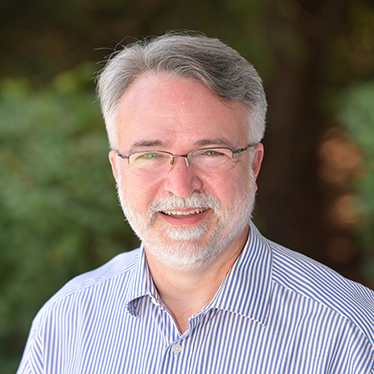Fine Arts
The Tale of a Playwright
Open gallery

If you want something to happen, make it happen. Such is one of the teachings of James Venhaus, a director of fine arts and published playwright who graduated from Southwestern University in 1991. Venhaus has written 18 plays, and his works have been produced in secondary schools across the nation and abroad. From creating his own opportunities as a Southwestern student to his playwright origin as an actor who found a void in the world of playwriting he wanted to fill, Venhaus’s story is one of creative action and drive. I was recently given the opportunity to sit down with Venhaus for a virtual interview and ask him about how his time at Southwestern prepared him to achieve success as a creative.
Acts of creation in education
So, Southwestern appealed to me because it was small enough where I knew if you wanted to be onstage you could be, but a good enough school that I was still going to get the training I needed to be a professional
Venhaus’s interest in theatre began, first and foremost, with acting. “The first time I ever got onstage and got a laugh, I think I was hooked,” he recounts. As he advanced from a self-proclaimed high school “theatre nerd” to an aspiring theatre major, he was on the lookout for a school that would give him a chance to perform in onstage productions. He initially considered a state school in Austin that offered him a scholarship, but this changed when he asked about acting opportunities: “they were very up-front with me about the fact that I probably won’t get onstage as an undergraduate. If I was going to get onstage at all, it was going to be in graduate school.”
“I wanted more experience. I wanted to be onstage. So, Southwestern appealed to me because it was small enough where I knew if you wanted to be onstage you could be, but a good enough school that I was still going to get the training I needed to be a professional,” says Venhaus. He also highlights the impact that Southwestern’s professors had on him, both in the theatre department and beyond. “I studied debate … and learned how to articulate ideas from both sides. I learned about the human mind, I learned about literature, I learned about science and math — things that I didn’t think I needed to know at the time, to be honest,” Venhaus admits.
He also believes that his experiences with Southwestern’s professors have influenced him as an educator. “I was surrounded at SU by master educators, and I find myself saying things to people that I know … a professor said to me when I was an undergraduate,” he says. “When you’re surrounded by fantastic professors, you’re bound to pick up a few things.”
“And I should also point out that there was, at the time—I hope there still is—an undergraduate playwriting course at Southwestern. And that was taught by a guy named Jim Fritzler, who was a huge influence on me as well,” says Venhaus. “In that class we had daily writing exercises, we wrote and critiqued our own work and critiqued our peers’ work … and [it] taught me how to articulate those ideas and those characters into compelling stories.” Playwriting is a course that is still offered at Southwestern 20 years later, and it is held every other year.
When recalling his involvement in productions at Southwestern, Venhaus draws particular attention to the importance of taking opportunities outside of your preestablished interests. “I learned sound design at Southwestern because I was the only person who was willing to do it. I was at Southwestern from ’88 to ’91. There was a reel-to-reel tape recorder in the booth, and I spliced together sound cues with an actual razor blade and tape,” he says. “During the time that I was a professional actor, that’s how I made my living for almost ten years. I think I got more work as a sound designer, just because Southwestern had that opportunity.”
“And then if there weren’t opportunities, we created some,” Venhaus states. “Some friends of mine and I decided we were going to do a show. And we did a series of scenes and monologues we directed ourselves. We had the full support of the faculty. There were opportunities to create your own opportunities.” This is something that he emphasizes when advising current and future Southwestern students: if you want more opportunities, make them. Southwestern fostered this entrepreneurial mindset within Venhaus that he has carried with him throughout his career.
Write the change you want to see
Immediately after graduating, Venhaus felt the stress of post-university responsibilities. “Because immediately you’re caught up with the rent, and the gas in the car, and those kinds of things. … There was a period of mild panic right after I graduated, but I think the entrepreneurial spirit of Southwestern helped me get through that.” He adds, jokingly, “I was an actor for almost 10 years until I grew into this obsession with paying my rent and eating on a regular basis.” However, even when Venhaus left his career as an actor, he never left theatre. “I became an educator, I became a theatre teacher, and then later on I became a playwright.”
When asked about why he decided to pursue playwriting, Venhaus says that the decision was based on his own experiences as an actor and the types of plays he saw — or didn’t see — being written. “I’m hopefully not the first playwright who grew out of playwriting as a frustrated actor to write the kind of plays that I wanted to be in,” he says. “I didn’t write parts for myself, but I wrote the kind of things I wanted to see, and wrote the kind of plays I wanted to be in, and I felt like there was a void of new plays that were accessible and that were things that I enjoyed.” His playwriting journey started with a 10-minute Christmas-themed play that he wrote for a festival held by a theatre company in Dallas. The festival wasn’t held that year, so he sent the play out to other companies until one decided to produce it.
Getting one of his plays published for the first time was a more daunting task. “The kind of rejection you have to be ready for as a playwright, being an actor is a fantastic training ground for that,” he says. “I worry about my friends who are poets, or who are fiction and nonfiction writers, and they want to try their hand at playwriting … The only person you need to write a poem is yourself. When you write a play, you have to have actors, and you have to have a stage, and … you don’t get to make that decision 100% by yourself.”
“You don’t start with regional theatre, you don’t start with Broadway, you start with small theatre companies that are looking for new and creative things to do,” says Venhaus. “I wrote [plays] for theatre companies … and then those got into festivals, and those festivals got reviewed, and then those reviews get put in the envelope with your submission and sent to publishers. And then one publisher publishes your play, and then you’re a published playwright. Then that can open a few more doors.”
Venhaus also reveals another aspect of playwriting success: connections. “You can wait for the local theater to put out a call for submissions, or you can go volunteer and be involved in as many theatre companies as you can, and when they have a hole in their season or if they’re looking for new work, then you’re somebody that they know. Those connections are really important.”
The best part of being a playwright, according to Venhaus, is “opening night, because as an actor or as a director or as a designer, opening night starts the tension. … But opening night is when the pressure’s off for the playwright.” This is because the playwright’s job happens not only before the rehearsal process but also during it. “I’m watching rehearsals and I’m writing new pages and altering dialogue, and that’s the production process for a playwright. But the most satisfying part is sitting in the audience opening night and hearing the audience gasp or laugh or react to something that you’ve written. It’s a great feeling.”
In addition to his career as a playwright, Venhaus is a seasoned theatre educator who now works as the director of fine arts for Flint Hill School in Virginia. Venhaus’s philosophy includes the idea that fine arts educators should also be active professionals in their field of choice, and he uses his position to encourage teachers to pursue their creative professions outside of the classroom. “We provide professional development and support for the people in my department who want to pursue their art. I have phenomenal people in my department who are visual artists and performing artists who work all over town in the professional realm, and it’s fantastic to be able to support them and feel supported by them when I’ve got a play that’s opening or when I’ve got a project that I’m working on.”
Even a worldwide pandemic couldn’t stop Venhaus from persisting as an active professional. In the midst of a confusing and difficult time for the theatre industry, his recent playwriting project, Bitterroot, was performed as a filmed theatrical experience. In fact, the show is scheduled for live performances this September by the Orphan Girl Children’s Theatre in Butte, Montana. Being able to bring theatre to an audience in circumstances that oppose the very concept of theatrical opportunity is a high accomplishment. That said, like many creators and theatregoers alike, Venhaus is looking forward to the return of live, in-person theatre.
Becoming better people and a better Southwestern
Venhaus believes that a theatre education is overall important as a way of connecting people. “Theatre is the only course where empathy is on the syllabus,” he comments. “Studying dramatic literature from a variety of different cultures and perspectives, and studying characters who are not like me, helps me understand the people that I encounter and makes me more empathetic.” He goes on to say, “we’ve been taught to fear what we don’t know. And theatre teaches you to do the opposite. It teaches you to become those people for a little while and walk in their shoes and learn what it’s like to be them, and to empathize. … I think theatre teaches people to be better people.” He believes that Southwesten’s theatre program has been particularly impactful for him in this regard. “I’m a better citizen and I’m a better person from what I learned there. I’m definitely a better playwright.”
As he takes a final moment to reflect on his experiences at Southwestern, Venhaus shares his thoughts on how Southwestern’s spirit has carried on through the decades. “I’m continually impressed with Southwestern, not just as a theatre department but as a university. … It’s the same Southwestern, just better, or newer, or a little bit bigger … but it’s still the same heart.” He keenly summarizes: “Southwestern is still Southwestern.”














